- Home
- Mordecai Richler
St. Urbain's Horseman Page 7
St. Urbain's Horseman Read online
Page 7
Back to his cell and the never-ending other people’s bills and ledgers and fiddling.
It was three thirty before a merry Father Hoffman sailed past, tacking to say hello.
“Do you know who was sitting at the next table?”
Harry attended with a smile.
“Warren Beatty with a real sex pot. He breaks off a piece of bread, chews it, and slides it into her mouth with his tongue. Right in the restaurant. Rye bread.”
Finally Brother Bloom shuffled into Harry’s cell with the revised accounts he had demanded. Harry flung them aside, saying, “We’ve got to get a computer in here one of these days, don’t you think?”
“You’re a born momzer,” Bloom said, knowing how it grated on Harry to be spoken to in Yiddish. Claimed. Especially if Miss Bailey was within range.
And then it was time to go and Harry pondered alternatives. He could squeeze in a session at the Graphic Arts Society or take in the new flick at the Cameo-Poly. Or see Ruthy. He opted for his digs and the telly, remembering to pick up his laundry first, and settling into the Evening Standard with his fried eggs and beans. When David Bailey goes shopping, he read, if the bill comes to ninety-and-something pounds, he hastily buys more items before making out his check, because he doesn’t know how to spell ninety. David Frost is giving another breakfast party for thirty at the Connaught. Everybody who counts is in a dither about what to wear at Lady Antonia Fraser’s masked ball next Wednesday. Forty-year-old Bernie Cornfeld, head of I.O.S. with a personal fortune of more than a hundred million, is accompanied on all his travels by at least four mini-skirted lasses of Playboy pulchritude.
Harry dialed the Savoy. “May I speak with Miss Lollobrigida, please?”
“Miss Lollobrigida is not accepting any calls. Would you like to leave a message, please?”
“You better buzz her, baby, and see if she will accept a call from … John Huston.”
“Yes, sir.” A pause, then, “She is unavailable at the moment, Mr. Huston. Would you mind calling back in ten minutes?”
“Haven’t you got phones by the bathtubs there yet?”
A giggle earned.
“Well now, lemme see. I’m just leaving here. Could you please ask Miss Lollobrigida to stay right where she is. I’ll be along with a towel and my riding crop in ten minutes.”
Sprawled on his bed, unzipped, Harry reached for Mayfair, “a wedding night tussle for Susan Strasberg and film husband Massimo Girotti.” In the photograph she lies nude on the sheets, head arched back tensely, the hairy dago sucking her nipple. “Above right: see-through temptation fails to arouse her husband’s ardor quite enough. Below: the result – the husband’s cousin moves swiftly in.” She is spread on a bench, nude except for leather knee boots, and the cousin’s head is buried busily in her crotch. Lapping it up.
Harry turned to another page, “Quest,” a survey on the sex life of single girls in London today.
… I was sitting on the floor and he came over and kissed me and pulled me down on the floor with him. He pulled my dress off over my head and I suddenly realized I was blushing like mad, but he was ever so gentle. He put his arm under me and unclipped my bra and started to kiss my breasts and he rolled my nipples between his fingers to make them stand up. We were pushing our tongues into each other’s mouths as far as we could and I could just feel the edge of his thumb and fingers on my panties. They were only a tichy pair of paper panties and he tore the front of them open in a slit. His hands seemed to be everywhere, it drove me mad. I lifted my legs over his shoulders and rubbed my calves against the side of his head and then we made love – through my panties. We did it three times.
Afterwards, Harry dipped his fingers in his seed and smeared Susan Strasberg’s mouth and breasts with it, then he tore Mayfair to shreds, dressed hastily, and started up Haverstock Hill, toward the pub.
Harry paused at the corner of England’s Lane, looking for a phone booth, his little book of ex-directory numbers in his breast pocket, when he noticed a Silver Cloud Rolls Royce parked down the street. There was no driver in attendance. Drifting past, ostensibly without purpose, Harry opened the knife in his mac pocket and ran it the length of the Rolls, walking on some distance before wheeling around to slash the body paint on the other side, continuing back to Haverstock Hill. When he emerged from the pub and went to look for the Rolls, it was gone.
10
MR. POUND TRIED TO SKEWER JAKE ON THE STAND.
“Would it be correct to say that you, personally, find Germans abhorrent?”
“But – but – Mozart was a German,” Jake had ventured. “Beethoven. Why, even Karl M—— I mean, Kant was a German.”
“Even so, you abominate them. Is that right?”
“Why,” Jake had replied, seemingly appalled, “that would make me a racist, sir.”
Out there, he had thought, resuming his place in the dock. Out there, riding even now. St. Urbain’s Horseman. Deprived of his Barnaby “International,” without his bespoke riding habit from Jos. Monaghan Ltd. of St. Stephen’s Green, Dublin. Galloping, thundering. Over the olive-green hills of the Upper Galilee. Or possibly already in Paraguay. Out on the steaming flood plains of the Paraná, neck-reining his magnificent Pleven stallion with his bridle hand as he reaches into his goatskin saddlebag for his field glasses, searching the savannas below for the unmarked track that winds into the jungle, between Puerto San Vincente and the border fortress of Carlos Antonio López, where the Doktor waits, unaware.
Beware Mengele, beware, for it is the Horseman who once strode St. Urbain, bronzed as a lifeguard, trousers buckled tight against a flat stomach. Exhorting the men, mocking them, demanding vengeance.
How, Jake was asked again and again, as if it were perverse of him, could he still hate the Germans?
– Easily.
– Now look here, Nancy would reason sweetly, can you hate Günter Grass?
– Without any trouble whatsoever.
– Brecht?
– Unto the tenth generation.
Which Nancy, barely seven years old on V-E Day, could not comprehend.
And so how could he tell her, without seeming psychotic, about his Jewish nightmare, the terror that took him by surprise in his living room, striking only on those rare evenings when he brimmed over with well-being, a sense of everything having knit mysteriously together for once, his wife, the children they had made, so that he could even contemplate his shortcomings, his failures, his own rot and dying and, all things considered, it was tolerable.
If he attempted to explain it at all, he would have to begin with his living room and its commonplaces. Bourgeois commonplaces which, he had to allow, would have been anathema to him fifteen years ago.
It is a Friday night and although they didn’t light candles or perform such ablutions that would enable them to welcome the sabbath like a bride, something remained, and on occasion it stirred within him. Most likely after a good dinner. Roast rib of beef and baked potatoes, salad, cheese and wine. He reclines on the sofa, freshly ground coffee set before him, brandy in a snifter; he is overcome with languor, but trying to grasp whatever script he is considering. Nancy’s curled into an armchair, legs tucked under, listening to David Oistrakh play a Mozart concerto. Catching up on the Sunday newspapers at last, she tears out a recipe or an article on herbaceous borders made easy. Or she deliberates over the latest National Film Theatre program, knowing exactly what he wants to see. Curly-haired Sammy is lying on his stomach on the floor, fist jammed against his chin, blue eyes pensive, contemplating his jigsaw puzzle. Crayoning, Molly frowns. Only Ben isn’t there. He’s adrift in his bassinet, stoned on mother’s milk. Once the children have been tucked in for the night and should his lethargy pass, he will rouse Nancy, caressing her, and they will climb to the bedroom to make love, pausing by the maid’s door to say good night. She will flatter him in bed and he does not feel comparison-shopped. They come together. Afterwards, they plan holidays. Shall it be the Costa Brava this summer or the Loir
e Valley? Other, less fortunate, marriages will be a subject for self-satisfied speculation. Friends will be forgiven their inadequacies.
Or, possibly, Jake will succumb on the sofa, drifting into snores. Boorish, but at home. Meanwhile, if he wants a peach or an ashtray brought nearer, or cherries on a saucer maybe, Sammy will bring it. If he decides on a cigar, Molly will fetch it.
Somewhere else, there is war and rape. Famine. Rats gnawing at the toes of black babies. Outside, bestiality. Fire raisers. Enemies. This is the shelter he has provided for his family. They use it well and are at ease. The shattered greenhouse window was Sammy’s doing, a badly-placed goal. Nancy tends to the rose beds and tomato plants. He weeds. The persistent whirring from the kitchen is the nocturnal Mr. Shapiro, Molly’s hamster, racing nowhere on his wheel. Jake’s responsible for the stained wallpaper in the dining room, a champagne bottle’s eruption. The sideboard was Nancy’s folly. Her first auction. There’s food in the larder, wine in the pantry, money in the bank. His wife is the woman he wants. He enjoys the children.
– So, Yankel. How are you doing?
– I can’t complain.
Then there obtrudes the familiar photograph of a bewildered little Jewish boy, wearing a cap, a torn pullover, and shorts, his eyes aching with fear as he raises his arms over his head. There are other Jews huddled together on this narrow street in Warsaw. Wearing caps, supporting bundles. All of them, with arms raised. Behind them, striking a pose for the unseen photographer, are four German soldiers. One of them casually points his rifle at the petrified little Jewish boy.
“Children scratched their arms and with their own blood would write on the barracks walls, as did my nephew, this child here, who wrote: ‘Andreas Rappaport – lived sixteen years.’ ”
There is another photograph, this one of an astonishingly beautiful Jewess, squatting nude before a pit, the soldiers behind smirking. She is staring right into the camera without anger or reproach, but sorrowfully, attempting to conceal her pendulous breasts with her hands. As if it mattered. As if she wouldn’t be dead within seconds.
“How many do you estimate were murdered in Auschwitz? You were in a position to know.”
Boger: “I believe that it was approximately the number given by Höss.”
“That is, two and a half million people?”
“Two million or one million,” Boger gestures. “Who can tell today?”
Then, in Jake’s Jewish nightmare, they come. Into his house. The extermination officers seeking out the Jew vermin. Ben is seized by the legs like a chicken and heaved out of the window, his brains spilling to the terrace. Molly, whose experience has led her to believe all adults gentle, is raised in the air not to be tossed and tickled, but to be flung against the brick fireplace. Sammy is dispatched with a pistol.
“A terrible stench came out of the car, like the plague. These prisoners were loaded onto the trucks directly and dumped into the pits next to Crematory 11.”
“Were any of them still alive?”
“Yes.”
“Mengele cannot have been there all the time.”
“In my opinion, always. Night and day.”
11
FRIDAY.
After Thomas Neill Cream, following Lipski (the Poilischer paskudnyak), in the tradition of Dr. Crippen, the Seddons, Neville Heath, Christie and Stephen Ward … Jacob Hersh, former relief pitcher for Room 41, Fletcher’s Field High (lifetime record, 2–7), stood in the dock of Number One Court, having been delivered thereto once again from the cells below to stand beside Harry, a taciturn prison officer posted on either side.
Number One Court was dominated by an enormous circular skylight. The walls were paneled in oak. The Sword of Justice which hung above the judge, a very fayer and goodly sword well and workmanly wrought and gylded, presented to the City by a cutler in 1563, was suspended hilt downwards. A fresh bouquet of posies and sweet herbs, the traditional antidote to gaol fever, the vicious stench that had once emanated from Newgate below, had been set before the plum-cheeked Queen’s justice of Oyer and Terminer. The jury shifted from buttock to buttock on seats so obdurate as to surely make them surly, resentful, Jake feared.
Jake wore his cheapest, most conservative suit, something gray with hire purchase, shiny with virtue. His drip-dry shirt, especially chosen to ingratiate him with the jurors, was an Arrow. He had deliberated for more than an hour before settling on a tie, just the trick, from the sales rack at John Barnes.
Only yesterday the astute Mr. Pound had summoned Ingrid to the stand. Ingrid, appropriately pale yet fetching in a severe black suit, the hemline cut just a hint above the knee.
“What is your occupation, Miss Loebner?”
“I work as an au pair girl. I am a student.”
In short order, the bewigged Queen’s Counsel established that Ingrid was twenty years old, had been in the country for seven months, and came of impeccable family, her father being a dentist in Munich. On the night of June 12, she had been to see the film at the Swiss Cottage Odeon and had then stopped for a coffee at The Scene on Finchley Road. A stranger had approached her table.
“He purported to be Jacob Hersh and said that he was a film director.”
“Yes, sir.”
“Why did you believe him?”
“He showed me an identification card and a newspaper review of his last film.”
“And then what happened?”
“He asked me if I was an actress.”
“And what did you reply?”
“No. But he seemed excited. In a nice way, you understand. And he said I was just the girl he was looking for.”
“And then what happened?”
“He asked me to come to his house, yeah, to read from a script. He wished to know if my English was good.”
“You agreed?”
“There seemed no harm in it. He said Elke Sommer was also an au pair girl in Hampstead when she was discovered.”
“Miss Sommer is a screen actress of German origin. Is that right?”
“Yes, sir.”
“And are these the pages of script he asked you to read? Please examine them carefully before you answer.”
“Yes, sir.”
“The girl in the script is said to be attired, I quote, in only a nurse’s cap, a bra, a corset, and high-button shoes. She wields a riding crop, unquote. Did you wear such a costume?”
“I read the lines for him many times first, yeah. He seemed very serious, sir.”
“Then what happened?”
“He asked me to wear the costume as described in the script.”
“And what did you do?”
“I did as he asked. I read the lines in my bra and panties. He had no nurse’s cap, but there was a riding crop.”
“I see. And who played the other part, as it were?”
“He was the General Montgomery.”
“If it please your lordship, I will now hand up some further pages of script to be proven at the proper time …”
Jake stared at his shoes, squeezing his hands together. Never apologize, never explain.
The next witness was the long stooping cop with the correct face who had come to arrest Harry.
“And then,” Sergeant Hoare said, “I asked him once more if his name was Harry Stein and he said this is not Germany and he would not tolerate Gestapo tactics.”
“He refused to tell you his name?”
“He said he had chums in Fleet Street and he was familiar with police brutality. His exact words were, ‘No Cossack is going to plant a bloody brick on me.’ ”
“I see. Go ahead, please.”
“Then I asked him yet again if he was Harry Stein and if he knew a young lady called Ingrid and he replied this was still a free country in spite of Polaris and the American bases.”
“American bases?”
“He was wearing a CND button on his lapel. He tried to shut the door in my face.”
As the clerk brought Harry Stein the New Testament to swear on, the
usher coughed and asked in a small, courteous voice, “Religion?”
Harry’s silence was not merely hostile. It scorched.
“Are you, ah, Jewish?”
Before Jake’s eyes the ruinously expensive legal advice, the cajoling, the rehearsals, the tranquillizers, all went up in smoke.
“For purposes of census, taxation, and pogroms,” Harry proclaimed in a swelling voice, his St. Crispin’s Day voice, to the somnolent court room, “I am a Jew.”
It’s the rope, Jake thought. It’s the rope for sure.
The bewigged Mr. Pound fixed Harry with his most piercing look. “When you forced the girl upstairs into Hersh’s bedroom,” he asked, “was Hersh –”
“I didn’t force her.”
“When you led the girl upstairs, was Hersh already undressed?”
“I don’t remember.”
“You don’t remember?”
“He had his underwear on.”
“Powder-blue underwear?”
“I beg your pardon?”
“Powder-blue. The color.”
“Yes.”
Yes, yes. Sweat oozing from every pore, Jake forced himself to stop listening, already adjusting to prison life. He saw big goysy queens goosing him on the way to chow. Psychopaths calling him chicken because he wouldn’t join in the escape plan, maybe murdering him because he was unlucky enough to overhear the plot. No sitting in a centrally heated toilet with the avant-Guardian after breakfast; Instead a bucket fermenting in the corner of the cell all day and he too sensitive but agonizingly constipated. “Go ahead, dearie. I won’t look.” Depraved warders jew-baiting him. “You want smoked salmon? Chivas Regal? Monte Cristos? Matzoh-ball soup? Sure, Yankel. Just write your missus to send us a check on the numbered Swiss account.” And naturally he would fail to prove himself in the exercise yard. “There goes Hersh. Fainted at the carve-up. What a giggle.”

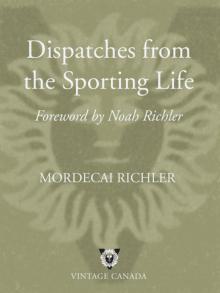 Dispatches From the Sporting Life
Dispatches From the Sporting Life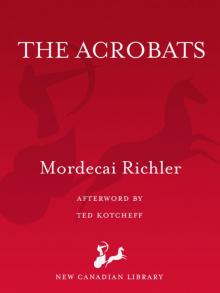 The Acrobats
The Acrobats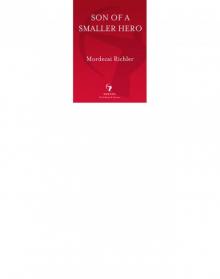 Son of a Smaller Hero
Son of a Smaller Hero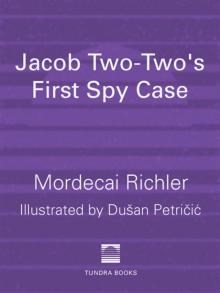 Jacob Two-Two-'S First Spy Case
Jacob Two-Two-'S First Spy Case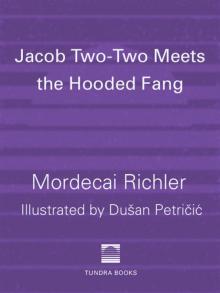 Jacob Two-Two Meets the Hooded Fang
Jacob Two-Two Meets the Hooded Fang Jacob Two-Two and the Dinosaur
Jacob Two-Two and the Dinosaur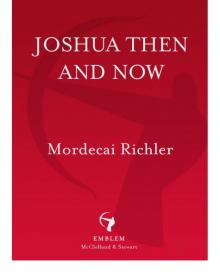 Joshua Then and Now
Joshua Then and Now Solomon Gursky Was Here
Solomon Gursky Was Here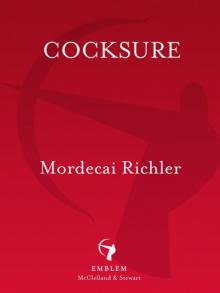 Cocksure
Cocksure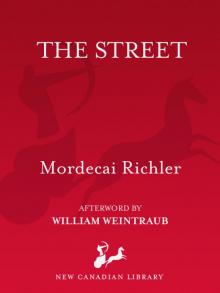 The Street
The Street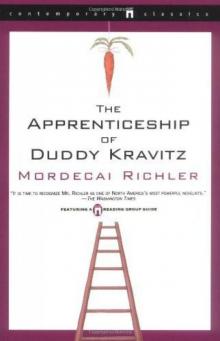 The Apprenticeship of Duddy Kravitz
The Apprenticeship of Duddy Kravitz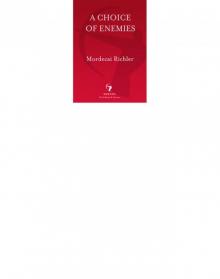 A Choice of Enemies
A Choice of Enemies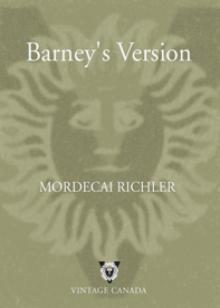 Barney's Version (Movie Tie-In Edition)
Barney's Version (Movie Tie-In Edition)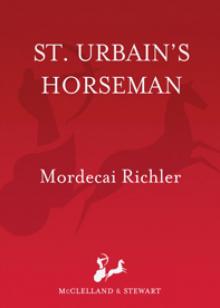 St. Urbain's Horseman
St. Urbain's Horseman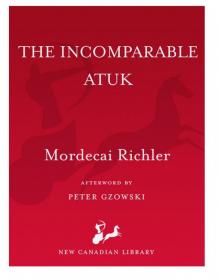 The Incomparable Atuk
The Incomparable Atuk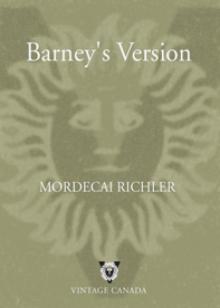 Barney's Version
Barney's Version